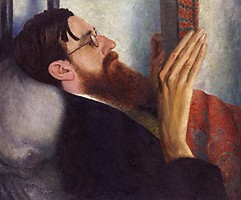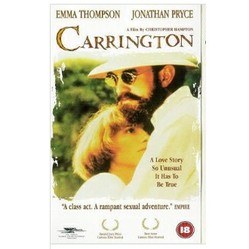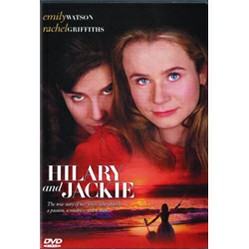I’ve just watched a movie called Carrington, about Dora Carrington and her relationship with a gay writer, Lytton Strachey, who wrote Eminent Victorians, a book that includes four studies, about Cardinal Manning (Henry Edward Manning), Florence Nightingale, Dr. Arnold (Thomas Arnold), and General Gordon (Charles George Gordon). The book is in the public domain (it was first published in 1918) and you can download it from gutenberg.org for free. It turns out Lytton Strachey was one of the Bloomsbury Set, which also included Virginia Woolf, E.M. Forster, and Roger Fry, among others.
Back to the movie. I picked this movie at the British Council Library the other day for Emma Thompson. Had no idea what I was getting myself into: who Dora Carrington the artist was, who Lytton Strachey was, and what the movie was actually about, for that matter. Didn't know either that besides the script for Dangerous Liaisons (1988), mentioned on the DVD case, writer-director Christopher Hampton also wrote the scripts for The Quiet American (2002), Atonement (2007), and A Dangerous Method (2011), among other films. Christopher Hampton’s script for this movie was based on a biography of Lytton Strachey by Michael Holroyd.
So I found myself watching Carrington without any expectations at all, baffled at its surprising turns and at the same time seeing them as predictable in the context of the bohemian society portrayed.
Emma Thompson was great, as always. But the surprise here, to me at least, was Jonathan Pryce, unrecognizable here in the role of Lytton Strachey, for which he won Best Actor at Cannes in 1995. (At the same festival, Christopher Hampton won the Special Jury Prize unanimously.)






 Funny T-Shirts and Mugs for the First Year of the Covid Eraon 10/15/2020
Funny T-Shirts and Mugs for the First Year of the Covid Eraon 10/15/2020
 Cool Gadgets for Geeks and Travelers Part 3, Great Gifts This Christmason 05/06/2019
Cool Gadgets for Geeks and Travelers Part 3, Great Gifts This Christmason 05/06/2019
 25 Creative Get Well Gift Ideas for Coworkerson 03/08/2019
25 Creative Get Well Gift Ideas for Coworkerson 03/08/2019
 Perfect the Moment. Seize the Day and Perfect Iton 12/12/2018
Perfect the Moment. Seize the Day and Perfect Iton 12/12/2018



Comments
Thank you, Jennifer!
I had not heard of this movie - now I want to see it! Thanks for the excellent review.
Oh no, I wanted to see The Imitation Game and missed it. I'd like to see The Object of My Affection too :) It's not with Emma Thompson though. But I agree she acts in deep movies :)
Mira, The thought-provoking intricacies of Carrington's plot also get covered somewhat similarly in The Object of My Affection and in The Imitation Game. It's sad when the lack of reciprocated feelings gets in the way of friendship, as it appears to do in The Imitation Game and does not do in the fictitious Object of My Affection.
I find that Jonathan Pryce and Emma Thompson generally act in films which give me culturally enriching takeaways regardless of whether there's a happy ending or not.
Thank you, Lisa! I enjoyed your comment on the Bloomsbury Group too :-). Talented writers often are like that :-)
I enjoyed the film, and I agree with your incisive review! The Bloomsbury Group is fascinating, but the people were really quite snobbish and some weren't likeable.
Thank you for reading!:)
I haven't seen it. It sounds interesting. Thanks for the review.
Thanks, Shraddha. I hope you'll enjoy it! It's not a very happy movie, but it's a memorable one.
Thanks, Sheila, for your comment!